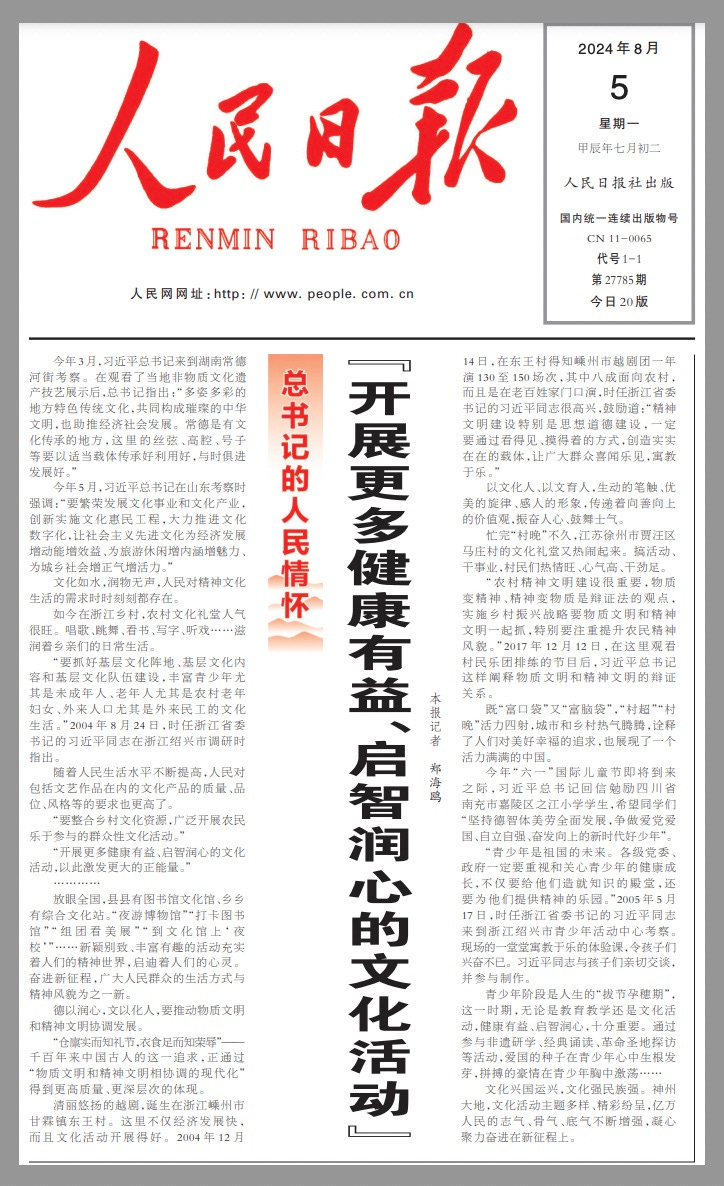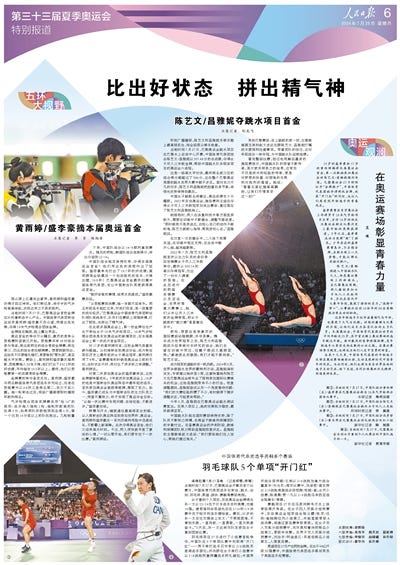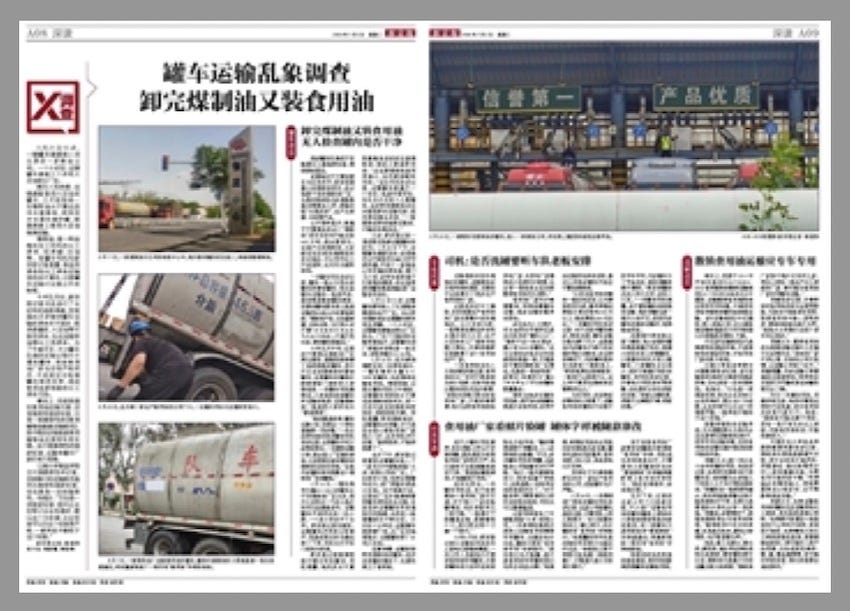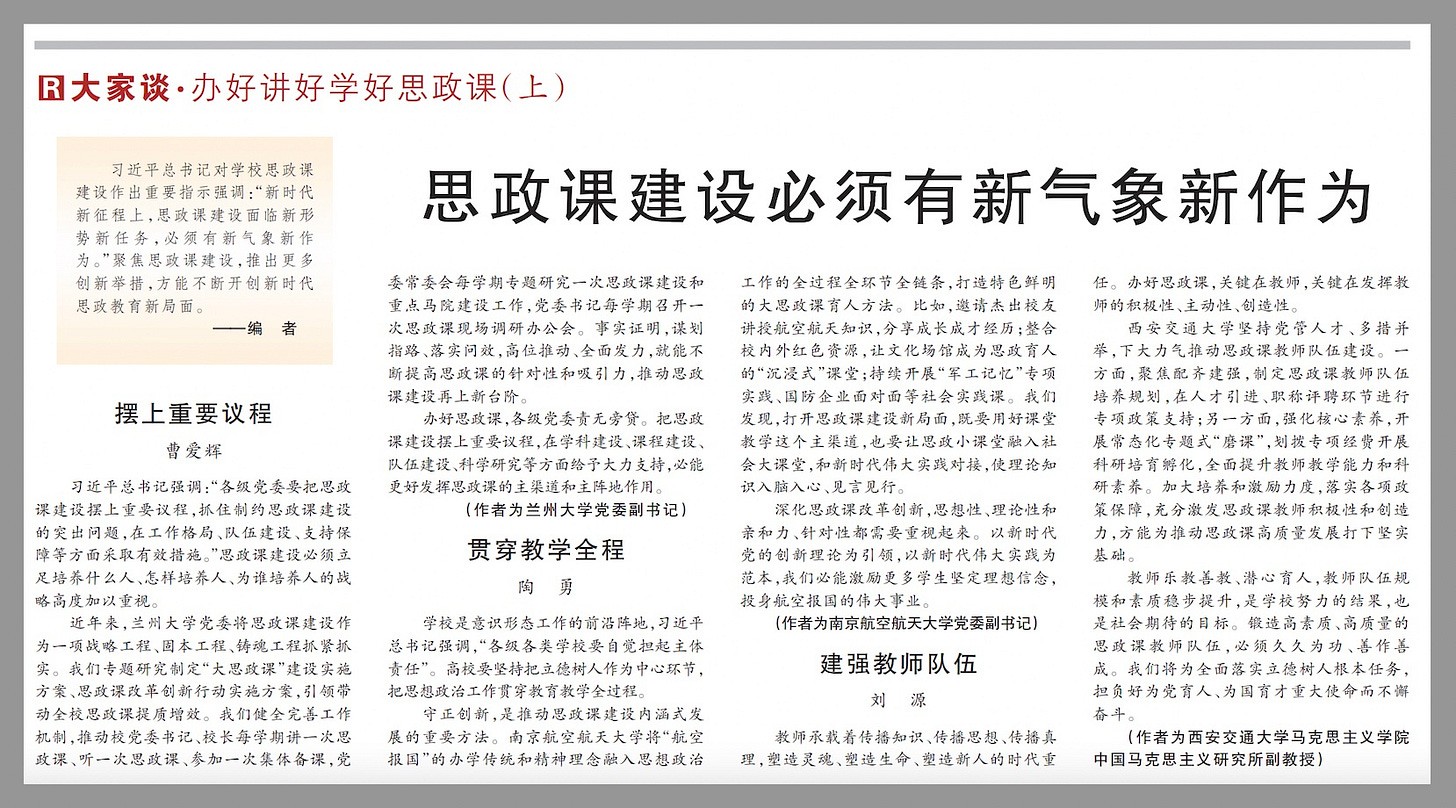Lingua Sinica Newsletter, 8 August
News, analysis, and commentary on Chinese-language media from the PRC and beyond.
Welcome back to Lingua Sinica.
In this week’s newsletter, it’s fair to say that we — like so much of the world — have Olympic fever. You can find stories below on how the Paris games have become the stage for shows of heavyhanded Chinese nationalism, harmful disinformation on a Taiwanese athlete, and some prime examples of irreverent Hong Kong humor.
With forays into Sino-Italian relations, PRC media influence in Afghanistan, and state media in Latin America, it’s also an especially international edition, in the Olympic spirit.
We didn’t get the chance, this time around, to check in with relevant developments over in the United States, but Taiwanese media are currently having a field day with the Democratic Party’s pick for VP, Tim Walz. As reports here are keen to emphasize, the Minnesota governor spent a year teaching in Guangdong around the time of the June 4th massacre, and has been a vocal ally of Hongkongers, Tibetans, and others concerned with human rights in China.
In a move we can only hope will catch on for the rest of the election season, some outlets in Taiwan have also taken to likening him to the friendly “neighborhood uncle” (鄰家阿伯) in light of his down-to-earth Midwestern charm. In a country that used to be wary of soft-on-China Democrats from the US, it’s an interesting sign of how the political ground is shifting and the election’s potential consequences for the region are only becoming more central to the media narrative.
Stay tuned for more. And in the meantime, happy reading!
Ryan Ho Kilpatrick
CMP Managing Editor
IN THE NEWS
China’s “Cyber ID” Ambitions Go Way Back
“What the hell is an internet ID?”
In the latest move in an ever-expanding quest for control over the internet, the Cyberspace Administration of China and the Ministry of Public Security have jointly rolled out draft measures for national “cyberspace IDs” (网络身份认证) for netizens to access the internet. The draft, which they have released for “public consultation,” says the measures are voluntary and that this is a way to centralize pre-existing verification processes in the hands of private companies.
The words “draft” and “consultation” may be more cosmetic than consultative. Although the measures have attracted a growing trickle of international coverage, it seems like the two ministries have been playing a long game in pushing this technology. A pilot app for users to obtain cyber IDs was uploaded to Apple’s App Store in June last year (“What the hell is an internet ID?” one user asked in a review from March) and the Ministry of Public Security also filed a patent all the way back in 2016 for identifying netizens based beyond just IP addresses.
Beyond the serious concerns being expressed by citizens and experts about what the new ID system could entail (a “path to social control” according to sources cited by the SCMP), this trail of breadcrumbs into past planning raises serious questions about the integrity of “public consultation” — and whether these measures will stay voluntary for long.
CHAIN REACTIONS
China Hoy!
An ambitious propaganda publishing venture going back to the PRC’s roots.
You’re shopping for groceries in Lima, Peru, and at the checkout stand a bright magazine stares up at you, the cover filled with colorful Chinese lanterns: “China's economic recovery will benefit the world,” it says. La reactivación económica de China beneficiará al mundo.
Launched in Spanish-speaking countries in Central and South America and the Caribbean decades ago, China Hoy is better known to aficionados of the Chinese government’s external communication as China Today (今日中国) one of the country’s oldest foreign propaganda outlets. Founded in 1952 by Soong Ching Ling, the prominent Chinese political figure and third wife of Sun Yat-sen, the magazine was formerly known as China Reconstructs (中国建设), and was released by the Foreign Languages Press as a vehicle for promoting China to the outside world.
In addition to Spanish and English, China Today is published today in French (La Chine Au Présent), Arabic, German and Chinese, and is distributed in more than 150 countries around the world. Its parent organization is the China Foreign Languages Publishing Administration (中国外文出版发行事业局), which often cloaks its government connections overseas by emphasizing its corporate identity as the China International Communications Group (CICG). Whatever one calls it, this is a state-run media conglomerate directly under the CCP’s Central Propaganda Department.
In 2010, China Hoy opened offices in Peru to direct its South American operations, following the setup of a printing and distribution office in Mexico six years earlier to serve as its headquarters in Latin America. An ICP search of the China Hoy website shows that it is under CICG’s Western Europe and Africa Communication Center (西欧与非洲传播中心).
ANTI-SOCIAL
Punching Back
At the Olympics, as in so much else, Taiwan struggles to be seen by the rest of the world. Forced to compete under the cumbersome misnomer “Chinese Taipei” and forbidden from flying its national flag or playing its anthem at the podium, even fans displaying the most innocuous symbols of Taiwanese identity are being routinely manhandled in Paris by both official security and PRC nationalists.
So it was a bittersweet turn when one Taiwanese athlete managed to capture the world’s attention, but for all the wrong reasons. Boxer Lin Yu-ting (林郁婷) has faced a barrage of abuse stemming from misinformation about her gender. Despite being born and living her entire life as a woman, Lin has been accused of being a transwoman and having advantages over her opponents as a “biological male.” This was driven in no small part by British author turned “gender-critical” feminist JK Rowling, who tweeted that allowing athletes like Lin to compete could lead to the deaths of real women. The false claims about Lin and Algeria’s Imane Khelif originated from the Russian-helmed International Boxer Association, which claimed both failed sex verification tests in 2023 for which no medical evidence has been published.
President Lai Ching-te and former president Tsai Ing-wen both tweeted their support for "Taiwan’s boxing queen" (台灣拳后), while across the political spectrum, Lin’s case has also been rare point of convergence for Taiwan’s highly fractured media. CommonWealth Magazine (天下雜誌) recently featured a profile of her as a determined athlete who skillfully balances the physical demands of her sport with the complexities surrounding traditional ideas of femininity and gender identity. Singapore-based Initium Media (端媒體) also published an article lambasting the IBA’s inconsistencies.
While Elon Musk’s X has become a hive for misinformation and bigotry, support for Lin has been resounding on other platforms — particularly Threads, which has surged in popularity in Taiwan and Hong Kong thanks to their huge pre-existing Instagram user bases. There, the hashtag #IStandWithLinYuTing has been one of the most trending in Taiwan. User @meatballjim_illustration posted a short illustrated feature on Lin’s story, hailing her as "a true athlete, an extraordinary woman from Taiwan" and calling on the rest of the world to stop spreading "false accusations" against her.
REDLINES
Xi Jinping’s local culture push is more about red than read.
On the front page of the People’s Daily on Monday, pride of place just beneath the masthead was given to a report on the Chinese Communist Party’s efforts to enrich local culture. Part of a series running through the week called “The General Secretary’s Popular Sentiment” (总书记的人民情怀), which portrays Xi Jinping as a leader focused on the fundamental interests of ordinary Chinese, the report lauded various cultural initiatives at the county and village levels in China over the past decade – including the set up of local libraries, reading rooms, and cultural centers.
Cultural Waste
As David Bandurski and Dalia Parete wrote back in May, these local cultural initiatives, though they have been hyped loudly by the leadership, have experienced numerous problems – and, predictably, for such top-down campaigns, resulted in a great deal of waste. In many cases initiatives like rural bookrooms, which have tellingly been nicknamed “red bookrooms” (红色书屋), are highly politicized and avoided by residents. The China Youth Daily, a newspaper published by the Chinese Communist Youth League, has warned that rural bookrooms run the risk of becoming mere “image projects” (形象工程), a term often applied to empty or superficial endeavors meant to please government superiors.
Nevertheless, the People’s Daily this week persists with its cultural sloganeering. One of the more colorful phrases: the people must not just be “rich in their pockets” (富口袋), but also “rich in their heads” (富脑袋).
The same spot in the newspaper on Tuesday, continuing the Xi series, was a piece lauding the benefits for the people stemming from “Chinese-style modernization, another huge buzzword since 2021 that essentially claims a new form of modernization distinct from that of the West [CMP Dictionary]. Another big buzzword in the Tuesday piece was “common prosperity” [CMP Dictionary]. Today, the latest in the popular Xi series is a tribute to the general secretary’s environmental policies, lauding a phrase he now gets credit for but did not in fact originate, as we laid out in this CMP Dictionary post on “Green Waters and Green Mountains.”
MEDIA GAMES
For China, the athletic competition in Paris has been an Olympic opportunity for propaganda.
The Olympics are a perfect platform for any nation to project national strength through physical prowess, and for China the Games have long been regarded as a golden opportunity for international messaging. Breaking ever so slightly from its usual marathon of propaganda about the top leadership and government policy, the CCP’s official People’s Daily has dedicated a two-page spread for each day of the Games, extolling classic virtues like the power of youth and international friendship, and using each victory – correction, each Chinese victory – as another parable about the fruits of hard work and grit.
This Olympics has also been a media story for China for several reasons. First off, the international nature of the Games, hosted far away in Paris, has made it a challenge to control how the country and its athletes are perceived. Video from Radio Free Asia has shown Chinese athletes refusing on-the-spot interviews, with one saying they can only speak with the official state broadcaster CCTV. Footage has also circulated of Taiwanese spectators having signs ripped from their hands, even though these did not feature the national flag banned by the IOC. Taiwanese media have reported that China’s CCTV abruptly terminated its coverage of the gold medal final of the men’s doubles in badminton when the Taiwanese beat their Chinese counterparts. This decision was likely made to avoid the sensitive spectacle of the “Chinese Taipei” flag flying above the PRC’s.
For China, the media and communication side of the Games has also been about another competition – for global dominance in manufacturing and technology. On August 2, the People’s Daily listed out the Olympic equipment made in China, and noted that more than half of Olympic broadcasters worldwide are streaming their coverage through the cloud system of the Chinese tech giant Alibaba.
ON A LIGHTER NOTE
If You Know, You Know
Throughout this edition of Lingua Sinica, we’ve looked at how the Paris Olympics have been used for harmful propaganda and disinformation, but there’s a lighter side to the Games as well. In Hong Kong, which has punched well above its weight to clinch a record-breaking four medals, the memes deserve a medal of their own.
When fencer Edgar Cheung Ka-long (張家朗) beat his Italian opponent to clinch gold, Italy launched a formal complaint alleging that the Taiwanese and Korean refs adjudicating the match were biased, simply by dint of also being Asian. Local branches of Pizza Hut responded with a special promotion on pineapple pizzas — a bid, if we may borrow the language of PRC state media, to hurt the feelings of the Italian people.
But you don’t have to win gold to win the internet. For another Hong Kong Olympian, sprinter Felix Diu Chun-hei (刁俊稀), it only took one appearance in the preliminary round of the men's 100m dash. To understand why, you need to know a little about Cantonese swear words, amongst which “díu” (屌/𨳒) — a homonym for the athlete’s surname — reigns supreme. Like the F-word in the English language, “diu” can be used in nearly every context, and profanity-happy Hongkongers are often willing to give full play to its impressive versatility.
Appearing on the start-line ahead of his race, Felix pointed to the name on his bib and then made a cheeky “shh” gesture, as if letting Cantonese-speaking viewers in on the joke. He failed to advance or set a new record for Hong Kong, but he did manage to reach a level of viral fame normally reserved only for the city’s small but growing coterie of medal-winners.
CMP HIGHLIGHTS
China’s AI Hype Gets a Reality Check
Everywhere in the world these days, big promises about AI’s potential seem to be balanced with caution about the risks and challenges. But for China’s government, the potential of AI is not just immense – it’s historic. In an article published in the People’s Daily earlier this year, the powerful Cyberspace Administration of China said that being at the forefront of this emerging technology could do for China in the 21st century what the Industrial Revolution did for the UK in the 19th.
A calmer look at the landscape suggests these dreams of AI glory are way out in front of reality. In fact, implementing AI in daily work processes has not been easy for China. While its companies have made staggering progress, some visions for implementing the leadership’s AI directives appear to be half-baked. A journal for media professionals under the Central Propaganda Department recently chided outlets for giving in to “excessive hype” and “blindly following trends” on AI. Even outfits with the deepest state pockets have been struggling to find ways to look busy with AI. One Large Language Model designed for the state-run broadcaster CCTV generated just six episodes of a TV show after promising an AI-fueled 26. The project has since been sent back to R&D. In a telling omission that could mean China is also experimenting with foreign AI – or that no one is rushing to take credit – the broadcaster has since stopped listing which LLM was used to create its videos.
CMP Researcher Alex Colville has the low-down on Chinese AI hype in his piece for CMP this week. For readers who want early access to important stories and trends at the intersection of Chinese media and AI, consider becoming a paid subscriber, which gives you access to his China Chatbot bulletin.
When Meloni Met Xi
When Italy officially withdrew from the Belt and Road Initiative (BRI) late last year, the complete silence about the reversal in China’s state media was a telling measure of the prevailing mood. The visible exit of a G7 economy from Xi Jinping’s massive, multi-billion dollar signature program was a humiliating about-face.
As Italian Prime Minister Giorgia Meloni visited Beijing late last month, China seemed keen to shift the narrative, underscoring the benefits of the economic relationship. The Global Times, published by the CCP’s flagship People’s Daily, implied Meloni’s visit was an apology for its BRI withdrawal, which the paper suggested was a product of US pressure. It quoted an expert who said that Italy was there to atone for earlier misunderstandings, noting her need for Chinese support following unfruitful US visits.
Throughout Meloni’s three days in China, state media portrayed the event as a new beginning for Sino-Italian relations — a relationship that is indispensable for Italy’s future development. For more on how this played out in PRC coverage, read CMP Researcher Dalia Parete’s piece “When Meloni Met Xi.”
QUOTE/UNQUOTE
China’s Media Engagement in Afghanistan
Since the Taliban takeover in Afghanistan and the retreat of US forces in 2021, China has emerged as a subtle yet significant player in the world of Afghan media, where the West and regional powers like India have traditionally held sway.
This week, Lingua Sinica sat down with Dr. Hazrat Bahar, a postdoctoral research fellow at the Institute for Communication and Media Studies at Leipzig University, to gain a deeper understanding of Afghan media and how PRC influence in the space has been growing. Look out for the full interview on Lingua Sinica in the coming week.
Lingua Sinica: Media engagement has been an essential way for China to influence countries in the region. Have you ever seen this kind of media engagement by China within Afghanistan?
Hazrat Bahar: During the previous Afghan administration, Western and international influences dominated the media sector, with limited Chinese involvement. However, Chinese-language media collaborated with Afghan media networks such as Shamshad TV and Axon Media Network. China Radio International (CRI) had a contract with Spogmai Radio, under the Axon Media Network Umbrella, broadcasting CRI’s programs in Kabul and Kandahar twice daily. Kabul News Television, a private TV channel, produced a 2017 documentary on the Belt and Road Initiative. While China’s media role was not as extensive as Western contributions, it still played a notable part, including journalist training in China.
LS: Do you see any trend in how Chinese media engage with the different communities in Afghanistan?
Hazrat Bahar: All of the Afghani media networks just discussed are mainly owned by Pashtuns, establishing a robust link between China and the Pashtun community [the largest and most powerful ethnic group in Afghanistan, comprising nearly half of the country’s population.] This is notable as there is no indication of the same level of Chinese support for non-Pashtun media. The CRI Pashto page is quite popular, while the CRI Persian page lacks the same level of engagement in Afghanistan, pointing to a targeted strategy by Chinese media towards the Pashtun audience.
[NOTE: Pashto is Pashtuns’ native tongue. Tajiks and Hazaras, Afghanistan’s second and third-largest ethnic groups, both speak dialects of Persian, which serves as a national lingua franca. Both are official languages.]
CMP IN THE HEADLINES
Hu Gets Hushed
State media firebrand Hu Xijin (胡錫進), former editor of the nationalistic Global Times newspaper under the People’s Daily, has gone uncharacteristically quiet on social media lately.
It all started when Hu offered his interpretation of the Third Plenum Decision, released after the high-level CCP meeting late last month. Many were underwhelmed by the document, which was big on talk of reform but short on policy details. Not Hu, though — according to him, big changes were coming, if you read between the lines. His main takeaway was that authorities plan to bring up the private sector at the expense of the country’s old, bloated state-owned enterprises.
Authorities seem to have disagreed, however. Hu hasn’t posted for about two weeks. When questioned about this by Hong Kong’s Sing Tao (星島) newspaper he gave a cryptic non-answer: “Just go and read what’s online. Please understand,” he said. It’s unclear whether his accounts were formally suspended but it looks as though he at least received a reprimand and slinked off quietly to let the heat die down. It wouldn’t be his first time: Hu has deleted posts before that went a bit too far in trying to speak for China online, and lately, he’s even found himself targeted by the angry nationalist mobs he used to whip up. The whole inciting incident could also be a sign that Hu is no longer the Beijing insider he once was.
I shared these thoughts and more with The New York Times’ Taipei correspondent Chris Buckley earlier this week, and you can find me quoted in his dispatch “One of China’s Most Talkative Nationalists Suddenly Goes Silent.”
Breaking the Silence
This week, CMP director David Bandurski also spoke to the folks at China File for one of their conversations bringing together China experts to discuss the latest news.
The topic at hand was the ongoing food safety scandal uncovered last month by the Beijing News, which found that tanker trucks used to transport fuel were also being used to transport cooking oil, with no cleaning in between. CMP was the first to bring this now-rare example of investigative reporting by a state-owned newspaper to the attention of international media.
Check out the China File Conversation for more on what this story can tell us about the ways China’s media landscape has changed over the last decade, and revisit David’s original story here for more background on the scandal. You can also find CMP reporting on relevant incidents that he cites in his remarks, on a deadly fire at a Beijing hospital last year and a gas explosion in Hebei a few months ago, here and here.
TRACKING CONTROL
Political Education Starts with the Head
This week, the CCP’s official People’s Daily ran a triple feature on “ideological and political education,” or sizheng (思政), in China’s university classrooms, part of a more concerted push to weave notions of political obedience and Party loyalty through the process of higher education. Emerging in China in the early 1990s as the Party faced a crisis of credibility stemming from the 1989 Tiananmen Massacre, sizheng was first a special subject taught in schools as part of the country’s Patriotic Education Campaign [CMP Dictionary].
Under Xi Jinping, as the consolidation of CCP authority has been prioritized, sizheng has become far more integrated into the education process. Special books and training courses instruct teachers in every discipline on how to slip CCP value references into lessons. One biology textbook for universities urges teachers to link a lesson on DNA to the inheritance of "red genes," a reference to the Party's legacy.
Bow Down, Educators!
In the People’s Daily feature this week, three university officials and faculty voice their loyalty to the mission of sizheng — an act known as “declaring one’s position,” or biaotai (表态) — as they outline what their respective institutions are doing. “Led by the innovative theories and great practices of the Party in the New Era,” writes Tao Yong (陶勇), the deputy CCP secretary of Nanjing University of Aeronautics and Astronautics, “we will inspire more students to be firm in their ideals and beliefs, devoting themselves to the great cause of serving the country through aviation.”
In an annual report released this spring, Guangdong province’s Huizhou Engineering Vocational College detailed how it had beefed up “political and ideological education” since 2021 — bringing politics into every classroom. One sizheng training course at the university began with haircuts for students, with a chilling slogan on the wall behind that read: “Arranging Thoughts Begins With the Head.”
SPOTLIGHT
Introducing the CMP Discourse Tracker
This week our first CMP Discourse Tracker went out to paid premium (“high-level black”) subscribers. If you don’t want to miss out on this essential resource, which puts key trends in the political language of the Chinese Communist Party into context, consider becoming a paid subscriber today. But for a sneak peak of what you are missing, here’s a bit from our “Diplomacy in Focus” section.
Each month we survey world leaders to determine how they are emphasized (or left out) in the CCP’s official discourse, which can offer a view of how China is defining its priorities in foreign relations. How did world leaders fare in the People’s Daily in June 2024?
Malaysian Prime Minister Anwar Ibrahim was the most mentioned foreign leader of the month with 15 mentions. He was mentioned mainly due to the occasion of 50 years of diplomatic relations between China and Malaysia.China Daily published an article on this occasion, Malaysia-China relations: An exemplar for ASEAN countries, which likely explained the heavy coverage. A series of diplomatic commemorative events were held. Chinese Premier Li Qiang and Anwar exchanged congratulatory letters, and Li paid a state visit to Malaysia.
During the visit, they attended a luncheon with business representatives from both countries, and the two parties followed with the release of the “Joint Statement Between the People's Republic of China and Malaysia on Deepening the Comprehensive Strategic Partnership towards China-Malaysia Community with a Shared Future,” in which much of the wording following official PRC language, including the reference to a “shared future,” a clipped version of a phrase that has become core to Xi era foreign policy: “A Community of Common Destiny for Mankind” [CMP Dictionary]. While it seems to appeal to a set of shared values and goals as the core of international relations, this phrase incorporates traditional elements of Chinese foreign policy that prioritize a state-centered approach to human rights, while subordinating individual rights to the basic question of national interest. Despite the heavy hand of the Chinese side in the text, experts on China-Malaysia relations interpreted Malaysia’s actions as “dancing with (but not tilting to) China.”
CHINA CHATBOT
The Act of Kling
The latest thing from Chinese AI technology is Kling, an unpaywalled AI video-generator from social media giant Kuaishou (快手) that was released to the world last week. The New York Times even included it in a feature on how Chinese AI is “closing the gap” with its US rivals.
The quality of the videos generated is undoubtedly some of the highest-quality you will find at the moment, and unlike OpenAI’s top-end Sora, Kling is now available to anyone. Chinese netizens have had fun posting convincing animations online that it generated from their old family photos, as well as its strange morphing fantasies (which you have to see for yourself). Kuaishou is so confident in their new toy that they have announced they will use it to generate a short drama (短剧). Kling certainly has flaws, though. In our own testing we found it had difficulties with body movement and basic physics. When we asked it to animate a photo of swimmers diving into a pool, the results defied gravity.
Although Chinese users can make higher-quality videos and remove all watermarks if they pay a little extra, it’s still uncertain whether this could be used for effective disinformation campaigns. Generating anything substantial would be very tedious: each video is a maximum of ten seconds long, but takes five minutes to generate — so creating a two-minute-long video would take two hours and a lot of pressing the “extend by five minutes” button. The software also refused to use photos of President Biden and Donald Trump we uploaded for animation, or even politically-positive prompts like “give me a video of Trump and Biden hugging and laughing.”
This is an excerpt from our China Chatbot newsletter. Become a paid subscriber to get every issue of China Chatbot in full.


















Well written. It would seem to me that the results of the Plenum strongly suggest that, despite the fiscal give aways, the national center and it constituent interest groups do indeed hope to economically centralize the country and also greatly diminish local populations abilities to express themselves intellectually and creatively through their respective local public policies.